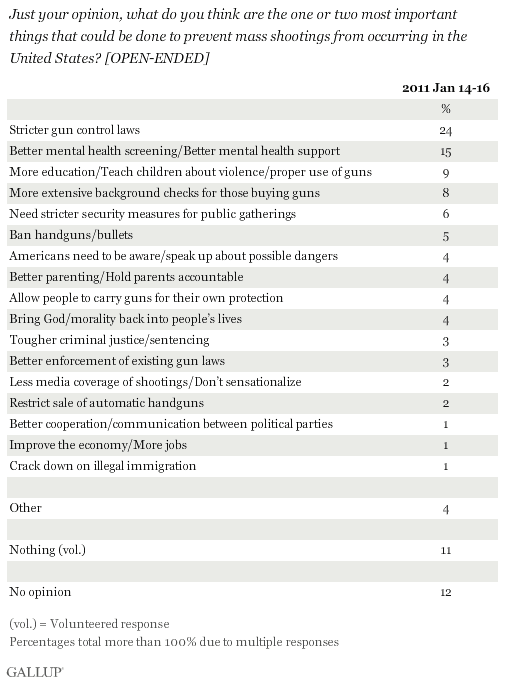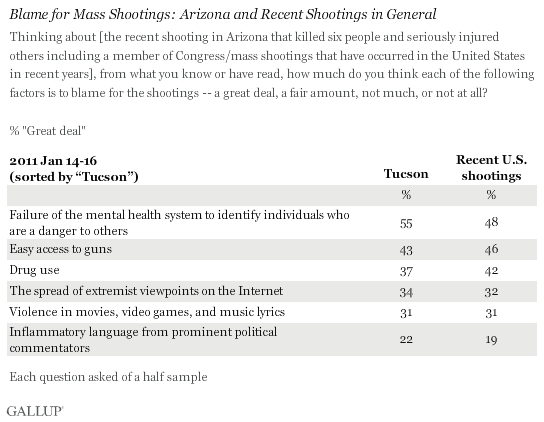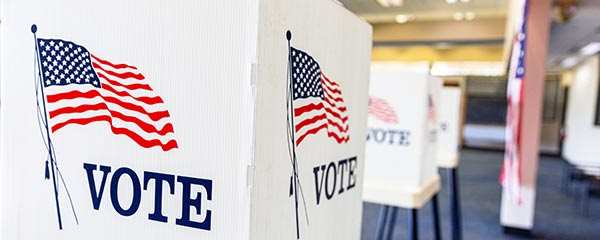PRINCETON, NJ -- Monday's scheduled arraignment of Jared L. Loughner, the man accused of killing six people and wounding more than a dozen others in Tucson on Jan. 8, again raises the issue of what can be done to prevent mass shootings. When asked what they think would work, Americans are most likely to make suggestions relating to guns, including stricter gun control laws, education about guns and violence, background checks for guns, and allowing more Americans to carry guns for protection. The second-most-frequently mentioned response involves improving the mental health system.

These open-ended results, from a Jan. 14-16, 2011, USA Today/Gallup poll, reflect a somewhat different pattern of results than that found in other Gallup polling conducted in the first days after the Tucson shootings. More than 7 out of 10 Americans in a Jan. 11 USA Today/Gallup poll said they did not believe stricter gun laws would have prevented that tragedy. A poll conducted in 2007, after the shootings on the campus of Virginia Tech, also found that the significant majority of Americans did not believe stricter gun control laws in Virginia would have prevented those shootings.
These findings underscore Americans' difficulty in grappling with questions about how to prevent these types of shootings. Additional gun control appears to be an obvious choice for many Americans. At the same time, the public appears to doubt that stricter gun laws per se would have prevented the specific tragedies in Arizona and Virginia, perhaps because of the intense focus in the news media on the accused perpetrator in each tragedy.
Americans also volunteer that improvements in the mental health system, better security at public gatherings, speaking up more about possible dangers, better parenting, and bringing God or morality back into people's lives might help prevent future shootings.
In addition to the open-ended question, the Jan. 14-16 poll asked Americans how much they would blame six possible causes for the Tucson shootings, and for mass shootings in general.
A majority of Americans assign "a great deal" of blame for the Tucson shootings to failure of the mental health system to identify individuals who pose a danger to others. More than 4 in 10 blame easy access to guns. These two factors lead the list of potential causes. They also emerge as leading factors when Americans are asked to rate the causes of mass shootings in general.

Speculation about the possible impact of highly partisan political rhetoric in causing the Tucson shootings provoked controversy in the aftermath of the incident. But of the six causes tested, Americans are least likely to consider "inflammatory language from prominent political commentators" as highly to blame for the shootings. More Americans perceive violence in popular culture, such as in movies, video games, and music lyrics, as causes. Drug use and the spread of extremist views on the Internet -- both of which were raised in news accounts of the alleged Tucson killer's lifestyle -- also receive higher mentions than inflammatory language.
Implications
No one knows at this point exactly what motivated the accused gunman in Tucson to show up at U.S. Rep. Giffords' town hall rally and allegedly shoot her at point-blank range and then shoot many others surrounding her. Nor is it clear why others around the country on a periodic basis are motivated to acquire firearms, and shoot at and kill innocent people. This lack of a full understanding of why the events occur makes it difficult for authorities or others in positions of influence to figure out exactly what can be done to prevent such incidents in the future.
The public's instinctive reaction when asked about shooting prevention is to talk about guns, perhaps because these types of mass shootings by definition involve individuals with firearms shooting other individuals.
Still, Americans clearly have mixed feelings about the ultimate impact of gun control to forestall future shootings. The public on the one hand believes that easy access to guns was at least partially to blame for the Tucson shootings. On the other hand, the majority of Americans do not believe stricter gun laws would have prevented either the Tucson shootings or the mass shootings that occurred at Virginia Tech in 2007.
Survey Methods
Results for this USA Today/Gallup poll are based on telephone interviews conducted Jan. 14-16, 2011, with a random sample of 1,032 adults, aged 18 and older, living in the continental U.S., selected using random-digit-dial sampling.
For results based on the total sample of national adults, one can say with 95% confidence that the maximum margin of sampling error is ±4 percentage points.
Interviews are conducted with respondents on landline telephones (for respondents with a landline telephone) and cellular phones (for respondents who are cell phone-only). Each sample includes a minimum quota of 150 cell phone-only respondents and 850 landline respondents, with additional minimum quotas among landline respondents for gender within region. Landline respondents are chosen at random within each household on the basis of which member had the most recent birthday.
Samples are weighted by gender, age, race, education, region, and phone lines. Demographic weighting targets are based on the March 2010 Current Population Survey figures for the aged 18 and older non-institutionalized population living in continental U.S. telephone households. All reported margins of sampling error include the computed design effects for weighting and sample design.
In addition to sampling error, question wording and practical difficulties in conducting surveys can introduce error or bias into the findings of public opinion polls.
View methodology, full question results, and trend data.
For more details on Gallup's polling methodology, visit www.gallup.com.
